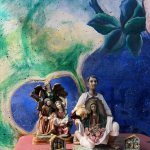Dear Future Student,
This class is really unique and special. It’s an unprecedented opportunity to leave the confines of the university institution and do tangible work with the communities invoked in the mostly theory based Ethnic Studies classes. In many cases, being able to work with your community partner means being able to leave La Jolla, and really discover some really precious pockets of San Diego. This class really allows you to have a more community based, praxis oriented lens.
The oral history process is very rewarding, and it’s really amazing to hear people’s stories and narratives, which are very complex and unique. It’s great to be able to feel like you are recording a really valuable piece of history, something that will be able to live on for generations. It also allows you to develop a greater sense of empathy, and some very crucial human skills that might not be very emphasized at the academic level.
Because this class relies on the schedules of community partners, there can be a lot of ambiguity and inconsistency. It is important to not view this as an inherently bad thing, and take this as a learning opportunity since the real world doesn’t represent the simulated environment of a classroom. There can be many great things that come out of ambiguity
It is really important to step away from the mindset of viewing this class as merely a set of assignments, and make sure you try to cultivate an authentic connection with your community partners. View them as a community partner you will work with beyond the timeline of this class, as people who you are forming a long term connection with. This is also crucial to making people feel comfortable with you, and making sure they don’t feel like you’re a disengaged voyeur trying to extract information from them “for a class project”.
View your community partners and interviewees as people who are agents and producers of knowledge. Do not assume you are “bringing something” to them because you are a student at an elite institution. The premise of oral history is being able to understand that there are different ways of knowing outside the parameters of academia and Western epistemology. This is a learning experience for you, first and foremost.
Lastly enjoy the process! The final showcase is a great event where you can look back at the connections you’ve made and the work you’ve done and feel proud and accomplished. This is an experience that you will probably not come across in other classes at UCSD. Savor it!


